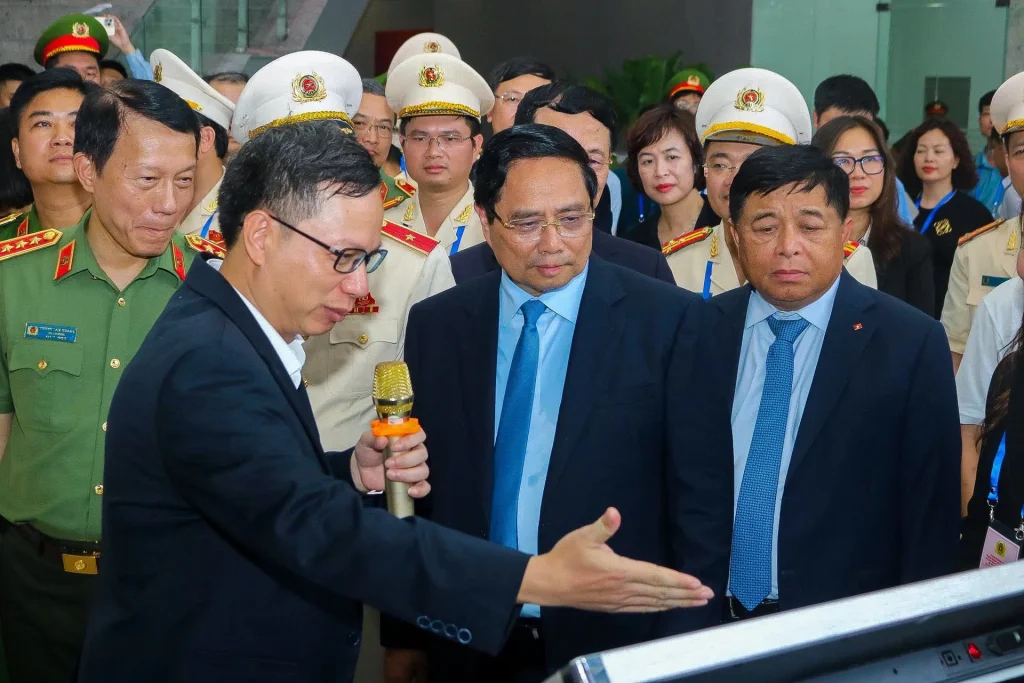[HO CHI MINH CITY] Vietnam is ramping up its blockchain push.
Besides government bodies and local firms rolling out network infrastructure, the country is forging home-grown crypto exchanges. These include those backed by lenders such as Military Commercial Joint Stock Bank (MB) and Vietnam Technological and Commercial Joint Stock Bank, or Techcombank.
The moves are meant to capture a market long dominated by global players.
Momentum picked up in June, when Prime Minister Pham Minh Chinh singled out blockchain as one of Vietnam’s 11 strategic technologies and highlighted its role in areas such as cryptocurrencies, digital infrastructure and origin traceability.
That same month, Vietnam’s parliament passed a new law officially recognising digital assets.
Major initiatives have been rolled out. One is NDAChain, a Layer 1 blockchain operated along with Vietnam’s National Data Centre; another is the Vietnamese Multi-Chain Blockchain Service Network (VBSN), developed locally by 1Matrix and inspired by Chinese and European Union models.
A NEWSLETTER FOR YOU

Friday, 8.30 am
Asean Business
Business insights centering on South-east Asia’s fast-growing economies.
Meanwhile, new locally run crypto exchanges are also in the making, including one created through a partnership between Vietnam’s military-linked lender MB and South Korea’s Dunamu, the operator of Upbit. The latter is the world’s third-largest centralised cryptocurrency exchange.
By developing fast, secure and compliant blockchain infrastructure, Vietnam is positioning itself not just as a leading crypto adopter, but also as an innovator of foundational technologies.
NDAChain – protection for national data
Vietnam’s National Data Centre, which inaugurated its first facility on Aug 18, is the central repository integrating data from 100 million Vietnamese citizens and thousands of governmental and organisational entities.
However, the traditional centralised data repository model faces challenges from rising cybersecurity threats, scalability bottlenecks and limited international compatibility, said the spokesperson of NDAChain.
NDAChain, developed by Vietnam’s National Data Association (NDA), is designed as a decentralised and permissioned blockchain that works hand in hand with the centralised National Data Centre.
It acts as a protective layer that authenticates and verifies citizen and private-sector data before it reaches the National Data Centre, thereby reducing system load and enhancing overall security.
According to its whitepaper, NDAChain is built on a customised implementation of Hyperledger Fabric, a globally recognised, enterprise-grade permissioned blockchain.
Unlike public blockchains such as Bitcoin and Ethereum, firms and organisations participating in NDAChain are carefully selected and supervised.
They must obtain permission to join the network either as validator nodes, which validate transactions and participate in consensus, or as full nodes, which store a complete copy of the blockchain ledger and help maintain the network’s security and decentralisation.
In the initial setup, NDAChain’s 49 validator nodes were run by major government agencies and leading local enterprises. These include major consumer-focused conglomerate Masan, Vietnam’s National Vaccine Company, real estate developer Sun Group, investment group Sovico and tech unicorn VNG.
However, hundreds or even thousands more could join the chain as nodes in the future.
“We chose security and scalability over decentralisation for the blockchain. The validator nodes are cherry-picked and spread across Vietnam, making the network more resistant to attacks,” the spokesperson said.
Several Layer 2 platforms have been launched on NDAChain. These include NDATrace, which enables transparent, end-to-end product traceability from manufacturing to consumer; and NDAKey, a digital identity verification tool that authenticates counterparties before making any online transactions and activities, thus helping to prevent identity theft and cyberfraud.
Europe and China-inspired blockchain network
Another attempt to form Vietnam’s blockchain infrastructure came with VBSN, which leverages concepts of the European Blockchain Services Infrastructure and China’s Blockchain-based Service Network.
Do Van Thuat, director of blockchain solutions and architecture at 1Matrix, part of the Techcombank ecosystem, said that VBSN hosts six open-sourced Layer 1 blockchain protocols that are mostly used worldwide.
“There is no one-size-fits-all technology solution; I believe no single blockchain perfectly meets all business needs and user requirements,” he added, noting that the team customises and optimises open-source protocols to meet the needs, purposes and application contexts of Vietnam.
He cited examples in which the company has converted public blockchain protocols into permissioned networks and achieved 100 to 200 times of performance improvements.
Beyond just rapid deployment, each Layer 1 blockchain created through VBSN is pre-integrated with essential tools such as crypto asset wallets, cross-chain bridges and smart contract development kits. This comprehensive toolkit drastically reduces the time and cost associated with launching and operating blockchain solutions, Thuat noted.
“It also makes blockchain technology accessible, even to traditional organisations without deep technical expertise,” he added.

Locally run crypto asset exchanges
Vietnam is ranked by US blockchain analysis firm Chainalysis as one of Asia’s top three crypto markets. Between July 2023 and June 2024, it had an estimated crypto transaction volume exceeding US$100 billion.
About one in six Vietnamese – around 17.4 million people – owned cryptocurrencies in 2024, indicated a report by crypto payment gateway Triple-A. In comparison, Vietnam’s traditional stock exchanges had just over 10 million accounts at the end of July 2025.
Binance is currently the largest centralised crypto exchange used by Vietnamese investors. Their trading volume is reportedly among the platform’s top 10.
However, under a draft resolution being developed by the finance ministry and expected to be approved this year, foreign players can offer only services related to crypto assets in Vietnam through a number of licensed domestic organisations.
Vietnam plans to require these service providers to obtain licences and meet stringent conditions, including a minimum charter capital of 10 trillion dong (S$492.5 million) and at least 35 per cent collectively contributed by two institutions such as banks, securities firms, fund managers or insurers.
Various players have then joined the race for early advantage.
On Aug 12, Vietnam’s MB and South Korea’s Dunamu announced a partnership to establish a digital-asset trading platform in Vietnam. In May, Techcom Crypto Exchange Company was also established as part of the ecosystem of private lender Techcombank.
These centralised exchanges, generally not built on blockchain networks, would typically hold users’ crypto assets in custody, provide a platform for buying and selling tokens, and allow users to deposit and withdraw in fiat currencies.
Their integration opportunities with blockchain network VBSN or NDAChain are broad, experts say.
VBSN could serve as the foundational layer for tokenising real-world assets, such as bonds and equities, before they are listed on such platforms.
Meanwhile, NDAChain plays a critical role in underpinning know-your-customer and anti-money laundering compliance, enabling secure onboarding of Vietnamese users and helping platforms meet regulatory requirements.


